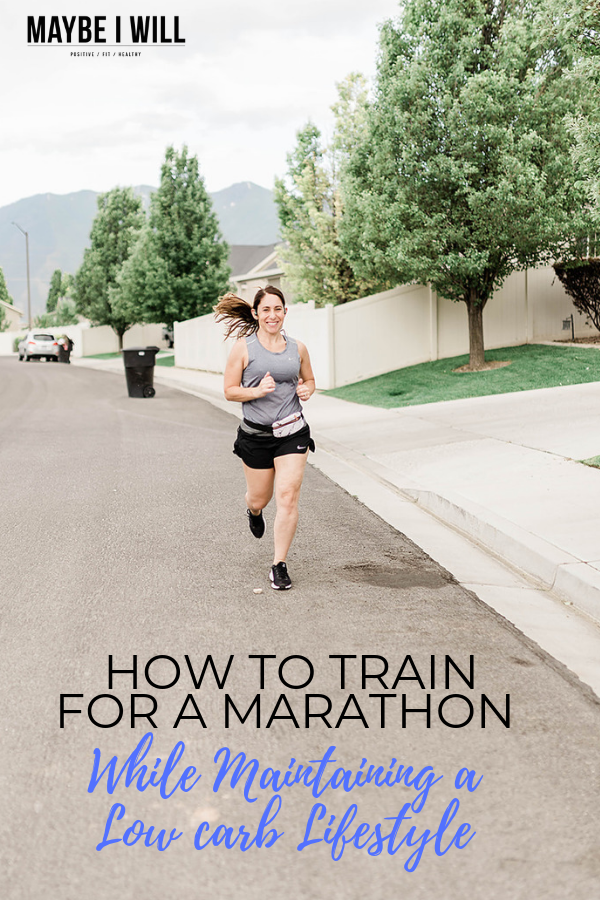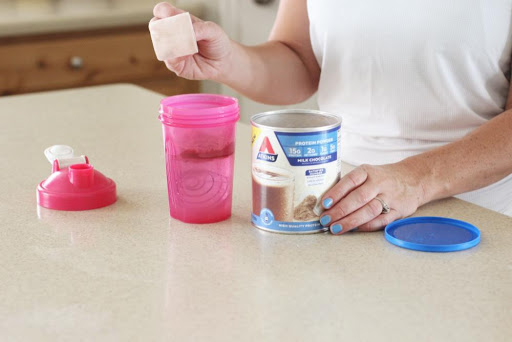How To Train For Marathon While Maintaining a Low Carb Lifestlye
This post is brought to you by Atkins Nutritionals but all opinions expressed are 100% my own.
How To Train For a Marathon While Maintaining a Low Carb Lifestyle, you may be surprised how easy it can be and how much your overall energy will improve.
Most people plan exotic vacations or plan big parties to celebrate their 40th. Not me. I choose to challenge myself to run a marathon. And not a half marathon but the whole, crazy 26.2 mile one. I am kind of nutty and I’m okay with that.
Now that I am officially in my 40’s I’m well on my way in the training for my first marathon. It has been a daunting task and at times I thought of just letting this little “idea” of mine fade silently into the night.
But honestly, once I started really training and running more than just a few miles on the treadmill, I actually started looking forward to my long runs. Just me, my phone with wireless headphones blasting my favorite tunes and the open road laid out before me. I have had some amazing epiphanies hit me as I logged these many miles.

I am constantly amazed at what my body is capable of. I’m usually scared to death as I set out for a 14, 15, or 16-mile run, but at the end I am still in awe that my body just did that! Not too shabby for a 40 yr old lady.

This was a little text exchange after my last run. Like my phone name for Kelly?
Another goal I have been working on is dialing in on my nutrition to help my body better cope with PCOS (Polycystic Ovarian Syndrome). As I mentioned a month or so back, my body has really responded to the Atkins low carb lifestyle. I’m feeling so much better and I have way more energy.
But I stood at a crossroads when it came to my marathon training since most training programs call for major carbohydrate loading. The basic philosophy is to eat a lot of carbs since your taxing your body so much.
I knew how great I felt eating low carb and I had done well working out while eating low carb but marathon training was a whole new world for me. So, I connected with Atkins and enlisted their guidance.
I teamed up with Jonathan Clinthorne, the Atkins Nutrition Communications Manager, and he was a HUGE help! He gave me so much guidance to help me train safely and effectively while maintaining an Atkins lifestyle.
I want to share some of the amazing information Jonathan shared with me so that you too can safely train for a marathon and still maintain a healthy low carb lifestyle.
Thanks, Jonathan! He’ll now walk us through How To Train For a Marathon While Maintaining a Low Carb Lifestyle.
While it goes against the common dogma that carbs are the best sports fuel, being a low carbohydrate athlete is not only possible, it can actually benefit your performance. Beyond simply wanting to avoid the sugar-laden foods that are typically the marathon runner’s staple diet, there are several reasons to go low carb while training for a marathon, which we will outline below.
- Reducing inflammation – because metabolizing fat for fuel produces less inflammatory reactive oxygen species, low carb athletes may experience less inflammation. This means less day-to-day soreness while training and faster recovery after racing.
- Becoming bonk proof – our bodies are capable of storing about 2000 calories as carbohydrates in a form known as glycogen. When a carb-dependent athlete runs out of glycogen, they experience a phenomenon known as “bonking” or “hitting the wall.” This is typically about mile 20 in a marathon. When you are a low carb athlete, you are burning more fat for fuel, helping you avoid hitting the wall. In fact, even a lean athlete weighing about 150 pounds with about 10% body fat would have over 50,000 calories of fat to use for fuel, meaning your fuel supply is nearly limitless.
- You want to be healthier overall – while exercise can make up for a great deal of poor eating, if you want to be as healthy as possible, going low carb and cutting out all the refined carbohydrates that make up the typical runner’s diet will help you with that goal.
So that’s the “why,” but what about the “how?”
Just like any change in diet, or physiological adaptation, becoming a low carb runner takes a little bit of time and experimentation. Here are some helpful tips on how to best make this transition.
- Be patient – it will take your body several weeks to adapt to this type of eating and you may feel a little sluggish while running. Be patient with yourself, and keep your intensity relatively low while you adjust to your new metabolism. You’ll know your metabolism has adapted when you can run for several hours with very stable energy levels.
- Stay hydrated and consume adequate electrolytes – carbs tend to hold onto water in the body so by cutting out most of the carbs in your diet you will lose some water weight. Make sure to drink adequate water and also consume extra salt. If you’re feeling light-headed or excessively fatigued, you probably have a slight electrolyte imbalance, so try drinking some full-sodium broth.
- Learn what foods work for you – many of the typical pre-run foods (bagels, bananas, pasta) don’t fit the low carb philosophy so you’ll need to find new snacks for your pre-run meal. I like a couple hard-boiled eggs and/or some avocado with salt. If dairy works for you then having string cheese is a great option. Other good pre-run snacks include nuts or nut butters, yogurt with low-glycemic berries, olives and cheese, or even a small portion of oatmeal with nut butter mixed in.
- Go low carb, not no carb – with the increased amount of exercise you will be able to consume more carbs than the average low carb-er and still get the benefits of eating low carb. Try Atkins 100 as a good starting point.
- Don’t under-eat – sometimes when people transition to a low carb lifestyle, they find it hard to get enough calories. This will make it very hard to properly train for a marathon. Make sure you are hitting your calorie goals. Supplement your calories with healthy fats from nuts and seeds, olives, avocados or any other natural sources of fat.

- Use low carb protein powders for recovery – many of the typical sports nutrition recovery products are loaded with sugar. For a high carb athlete, this is intended to spike blood sugar and force the muscles to store it, replacing spent glycogen. For the low carb athlete, who is burning fat for fuel rather than glycogen, getting protein after the workout is really the most important piece of the recovery puzzle, as that will help rebuild muscle tissue.
As I have been training over the last few months this information provided by Jonathan has been so extremely helpful. I feel so much better during and after a run. Even better than when I was younger and fueled my body with ALL the carbs. My favorite thing to grab right after a long run is a quick Atkins protein powdered shake made with Atkins Protein Powders. It’s super quick to throw together to fuel my body with some much-needed protein without any added sugar and without anything that can cause the “hidden sugar effect” – when carbohydrates convert to sugar when digested. You don’t see the sugar, but your body does. For more information on how hidden sugar affects your body check this article out on Atkins.com

And as an added bonus it tastes so good after a long run! I’ll even mix it up prior to leaving so it’s nice and cold when I get back.
So, marathon training while maintaining a low carb lifestyle is totally doable! In fact, like me, you might actually feel even better!

